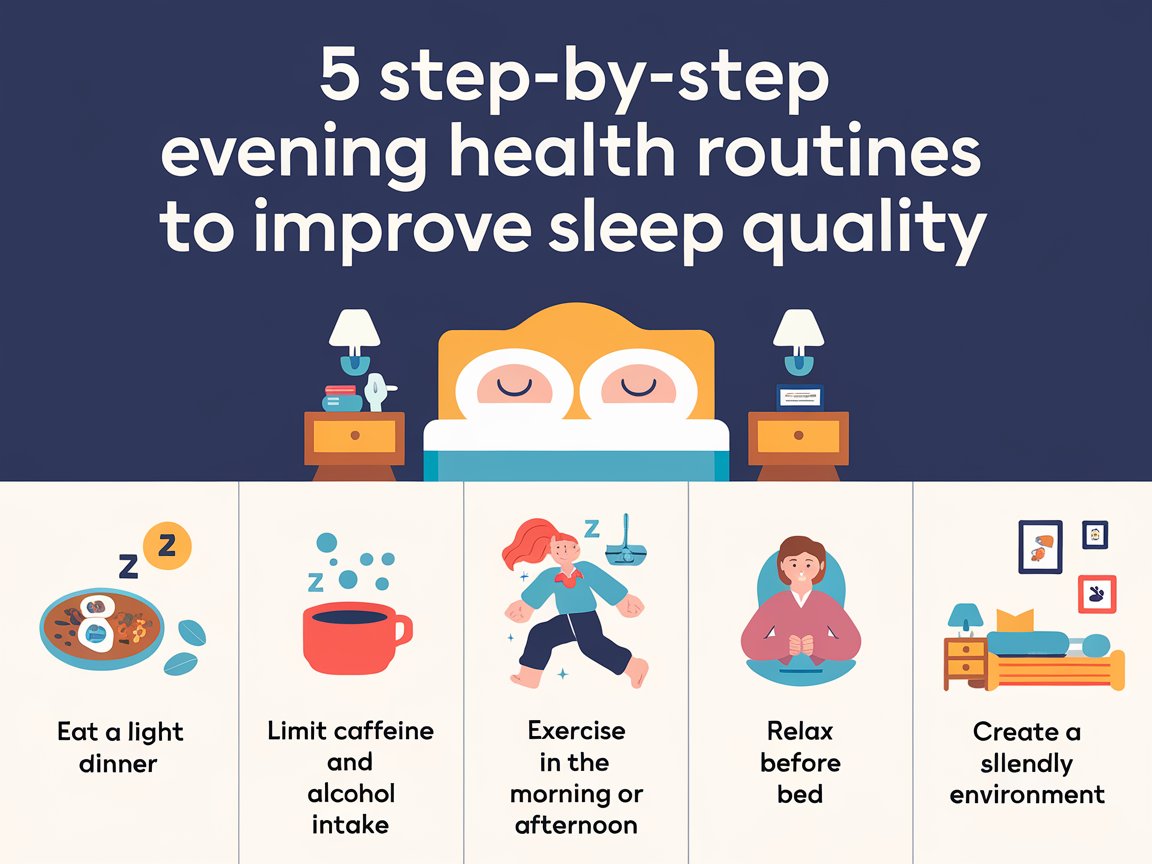5 Step-by-Step Evening Health Routines to Improve Sleep Quality
In today’s fast-paced world, quality sleep often takes a backseat to our busy schedules. However, improving our sleep is one of the most impactful changes we can make for our overall health, mood, and productivity. Establishing a consistent and relaxing evening routine can help you unwind, prepare your body and mind for rest, and ultimately lead to better sleep quality. Let’s go through a five-step guide to creating an effective evening routine that promotes a restful night.
1. Wind Down the Mind and Body
The transition from an active day to a restful night requires gradually slowing down both mentally and physically. Creating a wind-down period about 1-2 hours before your planned bedtime can signal to your brain that it’s time to rest.
- Set a Time: Set a designated time each evening to start winding down. This will help you build a rhythm, and over time, your body will recognize this as a signal to prepare for sleep.
- Limit Screen Time: Blue light from phones, tablets, computers, and even TVs can interfere with your body’s production of melatonin, the sleep hormone. Try turning off electronic devices or using blue-light blocking glasses. Reading a book, listening to a podcast, or journaling are excellent alternatives that don’t disrupt melatonin production.
- Choose Relaxing Activities: Engage in activities that help you relax, such as reading a light novel, meditating, listening to calming music, or doing a gentle activity like coloring. The goal is to choose something that relaxes you without overstimulating your mind or body.
By winding down, you give your mind the time and space it needs to slow down, making it easier to fall asleep when your head hits the pillow.
2. Create a Relaxing Environment
Your sleep environment has a big impact on the quality of rest you get. Creating a calm, dark, and quiet space can make falling and staying asleep much easier.
- Dim the Lights: Exposure to bright lights before bed can send wakeful signals to the brain. Dim your lights or consider using a bedside lamp with warmer tones. Soft lighting not only helps you relax but also mimics the natural progression from day to night, encouraging your body’s natural sleep cues.
- Set a Comfortable Temperature: Many studies suggest that a cool room, ideally around 65°F (18°C), is optimal for sleep. If this feels too chilly, find a temperature that’s comfortable for you but isn’t too warm. Using a fan, a cooling blanket, or simply opening a window may also help regulate the room temperature.
- Add Calming Scents: Aromatherapy can have powerful effects on your relaxation. Lavender and chamomile, for example, are known for their calming effects. Use a diffuser or pillow spray to add a subtle scent to your room and help set the mood for rest.
A relaxing sleep environment free from unnecessary noise, light, and temperature fluctuations can help you drift off faster and enjoy uninterrupted sleep.
3. Unwind with a Bedtime Routine
Incorporating a structured bedtime routine can help clear your mind and prepare your body for sleep. These habits create a sense of predictability and calm, helping you let go of the day’s stress and focus on relaxation.
- Practice Deep Breathing or Meditation: Deep breathing or meditation can calm your nervous system, making it easier to transition from a state of alertness to one of relaxation. Spend 5-10 minutes practicing deep breathing or using a guided meditation app. Techniques like box breathing (inhaling for four counts, holding for four, exhaling for four, and holding again for four) can be particularly effective.
- Try Gentle Yoga or Stretching: Gentle stretching or yoga poses can help release any physical tension accumulated throughout the day. Postures like child’s pose, legs-up-the-wall, and forward bends can help your body relax and prepare for sleep.
- Reflect and Journal: Many people find it helpful to jot down their thoughts, worries, or tasks for the following day. This practice can clear mental clutter, reducing anxiety or worry that might otherwise keep you awake.
Incorporating these routines can serve as a buffer, helping you release the stresses of the day and create a mindset focused on relaxation and rest.
4. Prepare Your Body for Rest
Preparing your body for sleep involves more than simply lying down at night. Practicing mindful eating, hydration, and avoiding stimulants are all part of optimizing your body for restful sleep.
- Avoid Heavy Meals: Eating large meals close to bedtime can make it hard to fall asleep due to digestive discomfort. If you need a snack, choose something light and easy on the stomach, like a banana or a small handful of nuts. Avoid heavy, spicy, or greasy foods within 2-3 hours before bed, as they may lead to heartburn or indigestion.
- Limit Caffeine and Sugar: Caffeine, found in coffee, tea, chocolate, and some medications, can linger in your system for hours. If you’re sensitive to caffeine, try to avoid it at least 6 hours before bed. Likewise, sugar spikes your energy and may interfere with your ability to fall asleep.
- Hydrate Smartly: It’s essential to stay hydrated throughout the day, but try to avoid drinking large amounts of water close to bedtime to minimize nighttime bathroom visits. Drinking too much water late in the evening can disrupt your sleep if you’re waking up frequently to use the restroom.
These steps help ensure your body is prepared for sleep and won’t be distracted by discomfort, digestion, or stimulants.
5. Establish a Consistent Sleep Schedule
Consistency is one of the most powerful ways to improve sleep quality over time. By creating a regular sleep schedule, you help regulate your body’s internal clock, which makes it easier to fall asleep and wake up naturally.
- Set a Regular Bedtime: Going to bed and waking up at the same time every day, even on weekends, helps reinforce your body’s natural sleep-wake cycle. If you’re aiming for 7-8 hours of sleep, count backward from your desired wake-up time to determine your ideal bedtime.
- Avoid Napping Late in the Day: Napping too late can disrupt your body’s natural sleep drive, making it harder to fall asleep at night. If you need a nap, try to limit it to 20-30 minutes and aim for earlier in the day.
- Stick to the Routine: Changing your schedule frequently or staying up late on weekends can confuse your body’s internal clock, making it harder to get quality sleep. Sticking to your routine, even when it’s tempting to sleep in or stay up late, will pay off in improved sleep quality.
Creating and maintaining a sleep schedule is one of the most impactful ways to support restful sleep. Over time, this consistency will make falling asleep easier and improve the quality of your rest.



